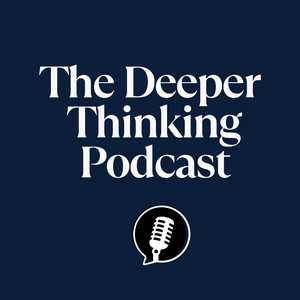The Shape We Live By: Storytelling and the Human Need for Narrative - The Deeper Thinking Podcast
The Shape We Live By
The Deeper Thinking Podcast
What if the stories we tell about ourselves don’t just reflect the world, but shape how we experience it? In this episode, we explore how narrative structures—from arcs to resolutions—don’t simply make sense of life, but create the conditions for how we understand time, meaning, and agency. We dive into the philosophical tension of whether life follows a narrative, or whether we impose one retroactively to survive the chaos. From war memoirs to courtroom dramas, we trace how narrative functions as a deeply human framework—shaping not only our stories, but our very sense of self. This is not an essay about storytelling for entertainment, but a reflection on how stories make us human, for better or worse.
As we untangle the threads of narrative, we draw on thinkers like Paul Ricoeur and Alasdair MacIntyre, who remind us that stories aren’t just reflections of the world, but the very means by which we experience it. But as narratives shape us, they also limit us. We ask whether the human mind can ever resist the pull to make sense of what might forever remain senseless. The episode asks whether we can remain present in the chaos, or if we will always rush to make it into something neatly packaged, ready for consumption.
With quiet references to Arendt, Heidegger, and Weil, we reflect on the fundamental question: does the narrative we tell ourselves free us, or trap us? This is not an essay that promises answers, but one that invites a deeper inquiry into the shape of the stories we live by, and whether we are, in fact, living inside a narrative of our own making.
Why Listen?
Consider how the stories we tell ourselves shape our understanding of time, identity, and meaning
Reflect on the tension between imposed narrative and chaotic existence
Engage with philosophical ideas about narrative, memory, and human agency
Experience an open, reflective approach to philosophy that doesn't seek closure, but invites exploration
Listen On:
YouTube
Spotify
Apple Podcasts
Bibliography
Arendt, Hannah. The Human Condition. 2nd ed. Introduction by Margaret Canovan. Chicago: University of Chicago Press, 1998.
Heidegger, Martin. Being and Time. Translated by John Macquarrie and Edward Robinson. New York: Harper & Row, 1962.
Weil, Simone. Gravity and Grace. Translated by Emma Craufurd. London: Routledge, 2002.
MacIntyre, Alasdair. After Virtue. 3rd ed. Notre Dame: University of Notre Dame Press, 2007.
Ricoeur, Paul. Time and Narrative, Volume 1. Translated by Kathleen McLaughlin and David Pellauer. Chicago: University of Chicago Press, 1984.
Bibliography Relevance
Each work referenced here deepens the philosophical and existential questions raised in this episode. They are invitations to engage more deeply with the implications of narrative and human understanding.
Hannah Arendt’s The Human Condition explores the fragile practices of labor, action, and thought—fundamental practices that technological acceleration risks unmooring, much like the existential dilemmas raised in this episode.
Martin Heidegger’s Being and Time frames existence as something to dwell within, not master—a theme that mirrors the philosophical tension in the essay about the limits of narrative mastery.
Simone Weil’s Gravity and Grace offers a meditation on attention as resistance—a fitting echo to the essay’s central focus on narrative attention and the danger of rushing to impose order on life.
Alasdair MacIntyre’s After Virtue discusses the relationship between virtue and the narrative structure of human life—deepening the reflections on the philosophical need for stories to shape and define our ethical lives.
Paul Ricoeur’s Time and Narrative illuminates the ways in which narrative shapes our experience of time—a crucial perspective for understanding how stories help create the reality we live in.
#NarrativePhilosophy #ExistentialNarrative #Storytelling #HannahArendt #Heidegger #SimoneWeil #Ricoeur #MacIntyre #DeeperThinkingPodcast #PhilosophyOfStory #HumanCondition #MeaningAndTime

